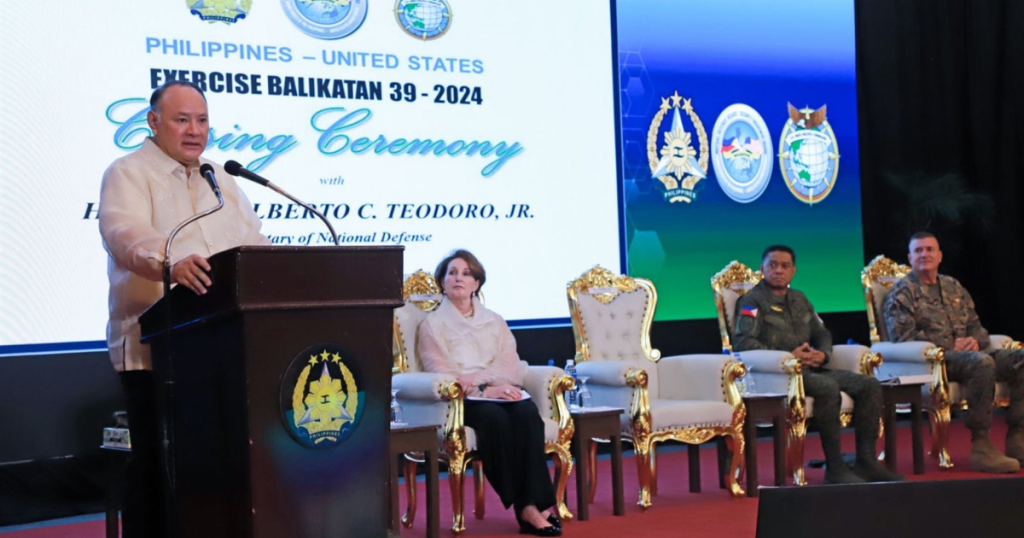Teodoro: Prepare for a conventional war scenario
Secretary of National Defense Gilberto C. Teodoro, Jr. during the closing ceremony of Balikatan Exercise 39-2024 at Camp General Emilio Aguinaldo. Photo from Department of National Defense.
By Manuel Mogato | Date 05-15-2024
Manila — After this year’s three-week-long, large-scale bilateral military training and exercises, Defense Secretary Gilberto Teodoro said he would want to see a more “conventional war” scenario in next year’s iteration of the joint and combined “Balikatan” drills.
Teodoro wanted to witness “a full battle simulation” next year to test the combined capabilities “in the most realistic scenarios possible with safety in mind.”
Teodoro said President Ferdinand Marcos Jr awaits an “extensive debrief” on successes and possible gaps in this year’s 18-day Balikatan, one of the most extended recent exercises.
There were many firsts in this year’s 39th iteration of the “Balikatan” drills, like the integrated air defense missile exercise, the combined artillery and anti-tank missile exercise to repulse an amphibious attack, the para-drop of supplies in the West Philippine Sea, and sea maneuvers in the exclusive economic zone.
“Overall, we are happy and satisfied with the results,” an Army colonel said. “However, we still need to improve and perfect these exercises, especially those we have done for the first time. They were near perfect, but we want 100 percent precision.”
Teodoro said the “Balikatan,” which is fast evolving into a multilateral, multi-domain training exercise, should continue among like-minded nations in this part of the world in the Indo-Pacific.
“No amount of malign, or for lack of a better term perverse, attempts to subvert our goal for a free and open Indo-Pacific and rules-based international order will stop our shared advance towards upholding this internationally-accepted norms, come what may,” said Teodoro.
Major General Marvin Licudine, Philippine exercise director, said next year’s drills would be more complex.
“The upcoming Balikatan 2025 will be more challenging, one that will be more complex, more demanding as we elevate the exercise to address contemporary security challenges,” said Licudine.
For his part, Lieutenant General Michael Cederholm, commander of the US Marine Expeditionary Force, said the exercise “directly built warfighting readiness for us.”
“It has enhanced tactics, techniques, and procedures across a wide range of military operations,” he said.
“But make no mistake. It should also pause any adversary who does not believe in a free and open Pacific, who does not believe in transparency, who does not seek peaceful resolution but would seek to use force to impose their will on other sovereign nations.”
Cederhold continued: “We have learned lessons from Balikatan, and those learning and refinement make us stronger. We, collectively, are better, more capable, and more lethal as a result of this exercise.”
Armed Forces chief of staff, General Romeo Brawner, said the exercise has deepened the collaboration of the Philippine and US armed forces.
“This increased our capability to come together in the full spectrum of military operations across all domains,” he said.
“I believe that next year’s exercise will be more complex, as mentioned by Major General Licudine, and I was told that starting this afternoon, they will already start the planning process for next year’s Balikatan exercise.”

